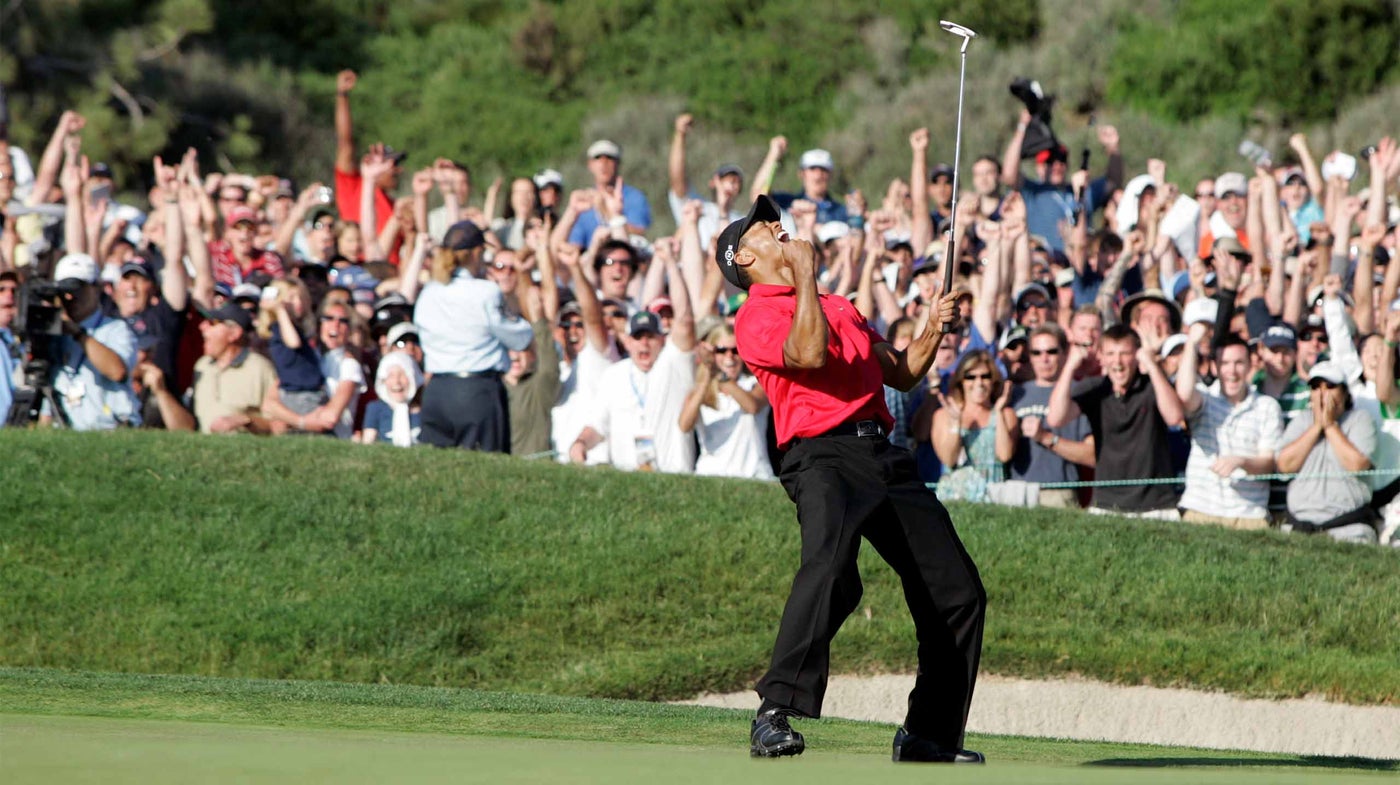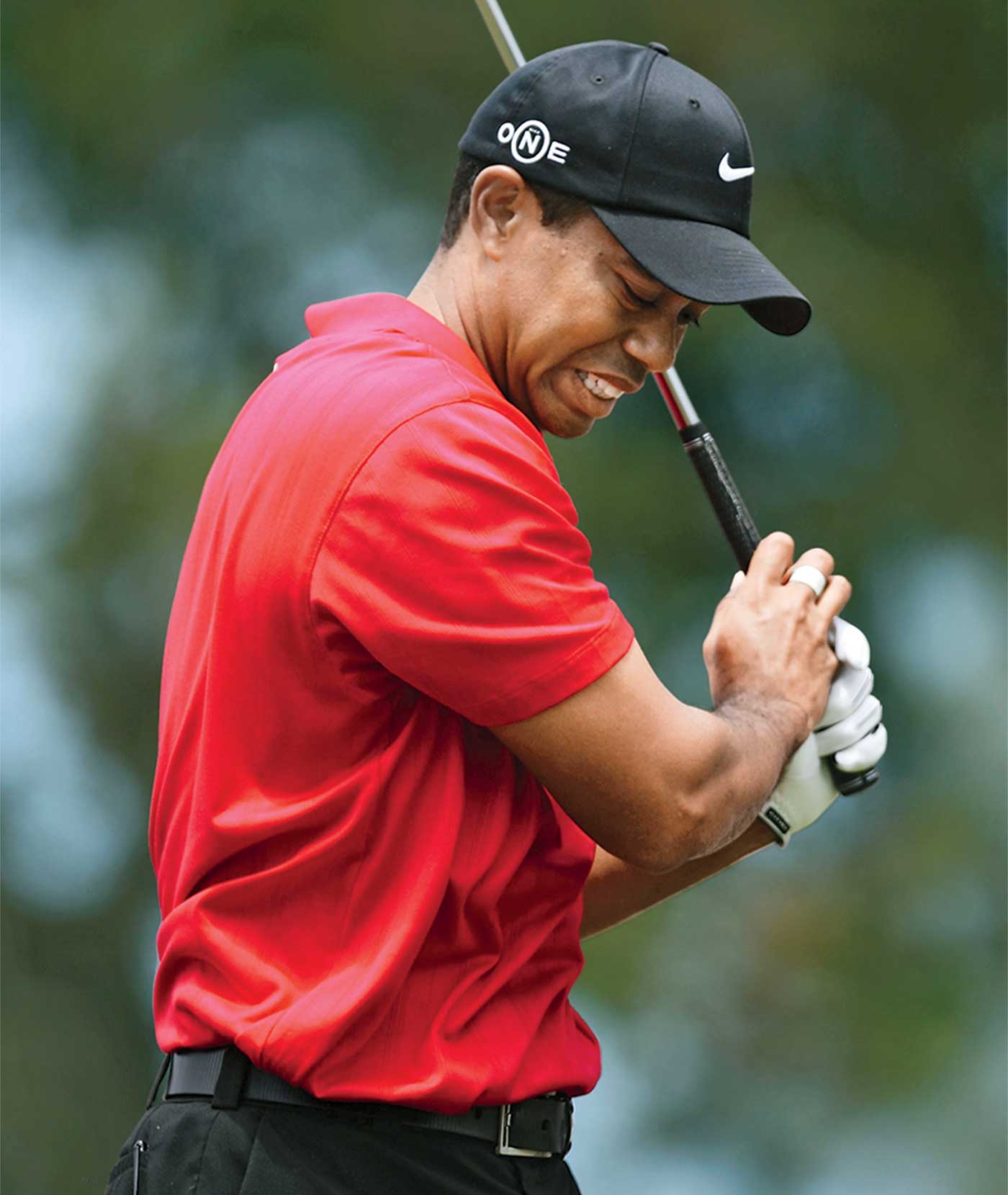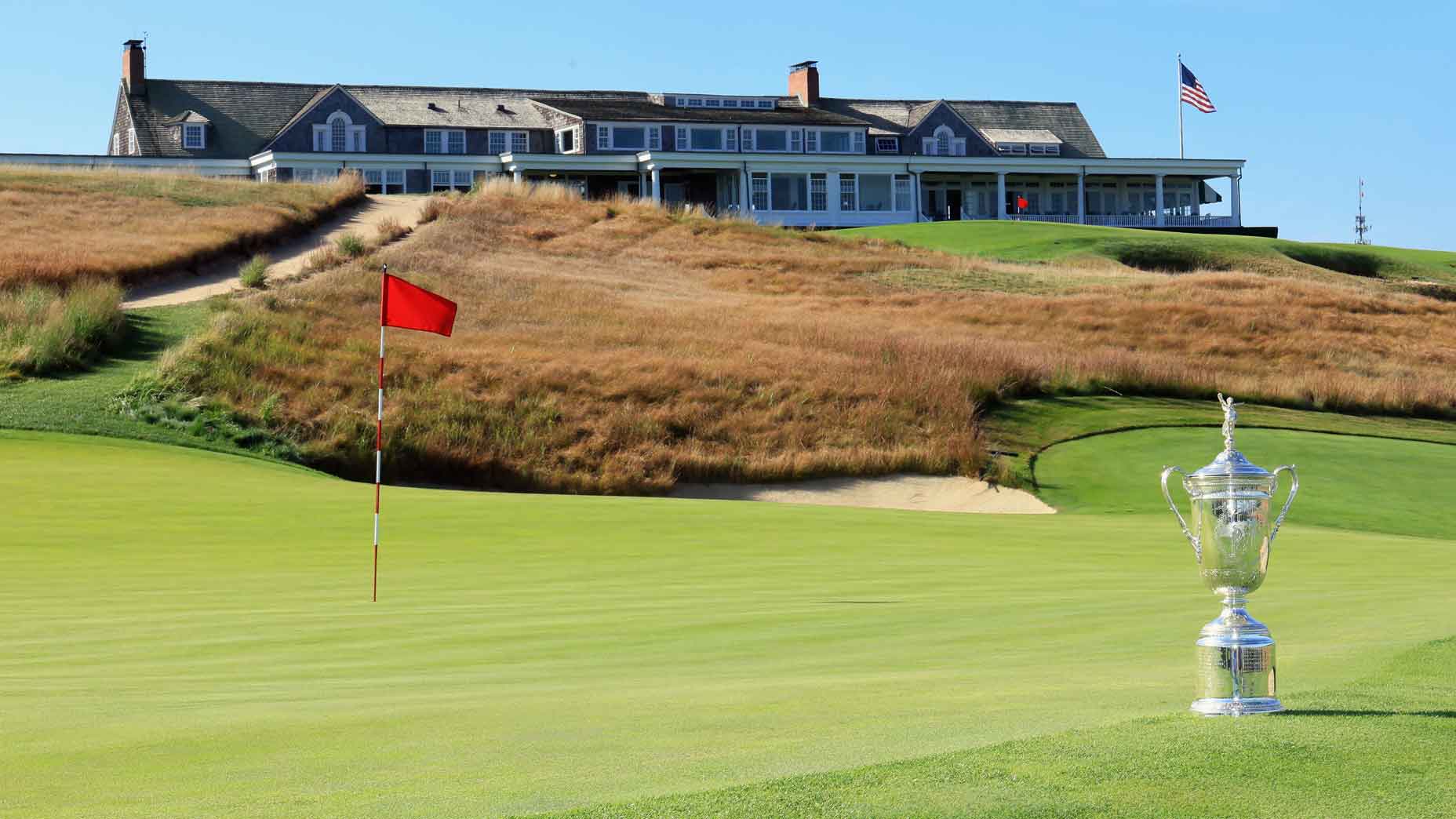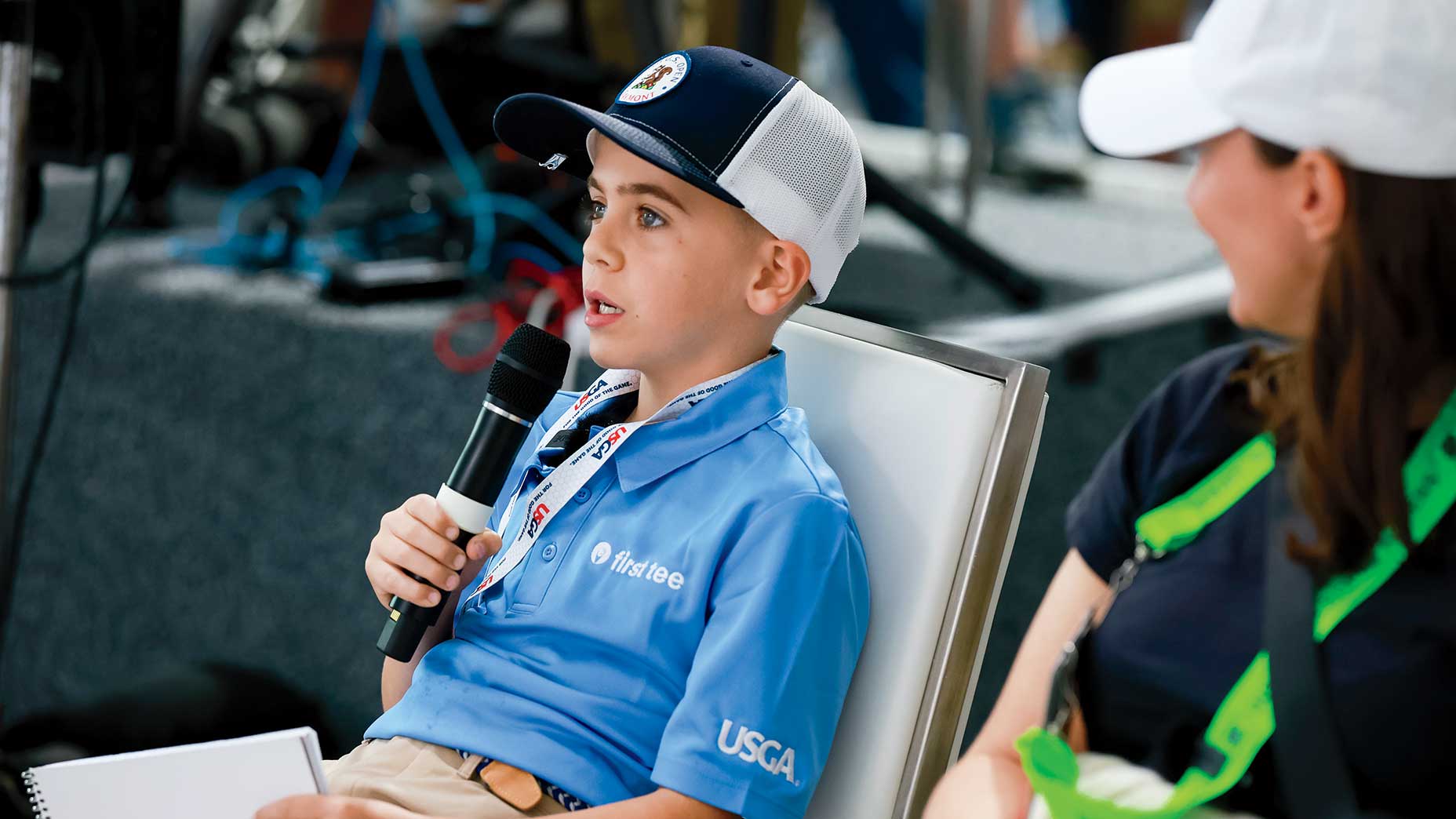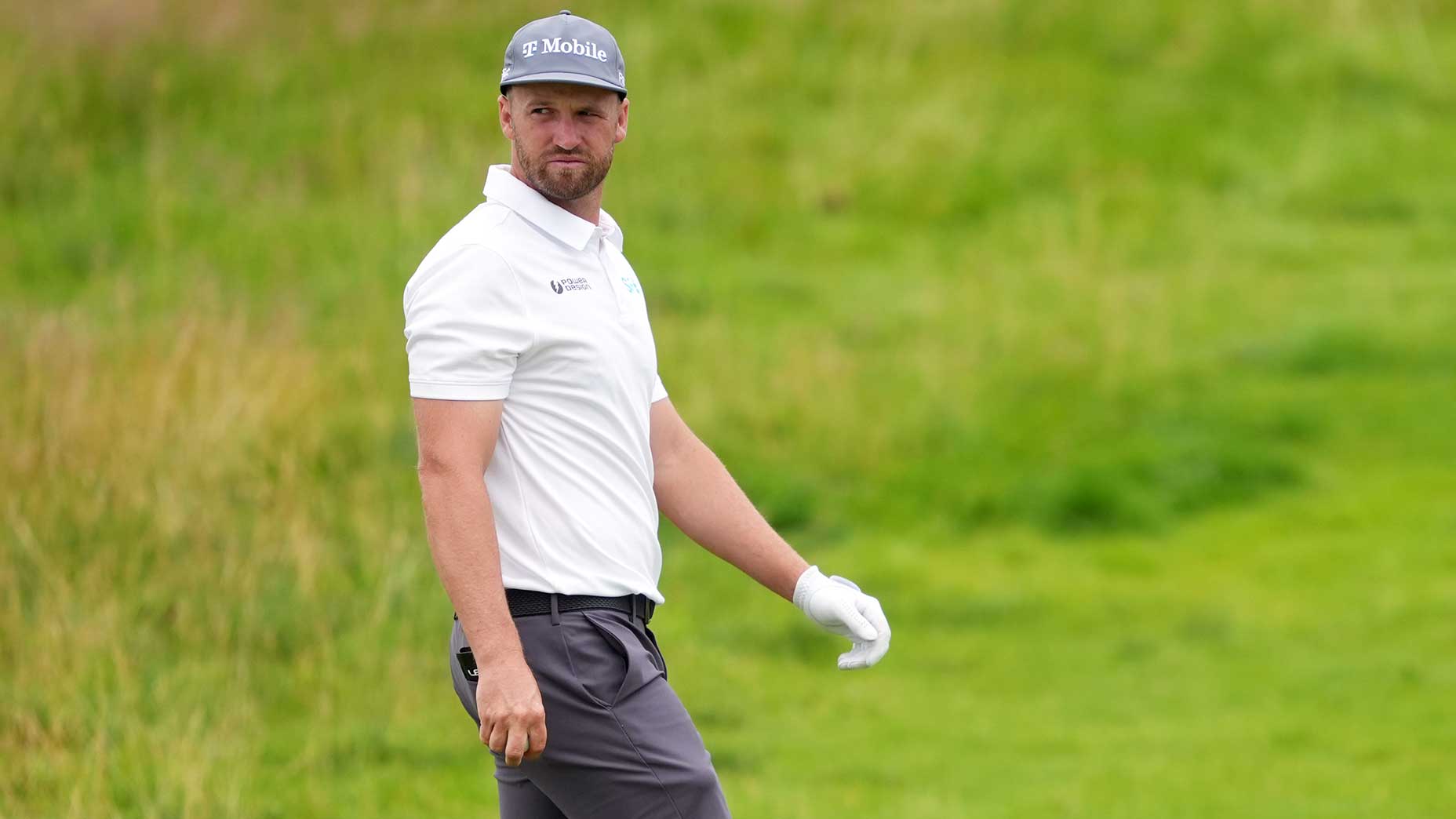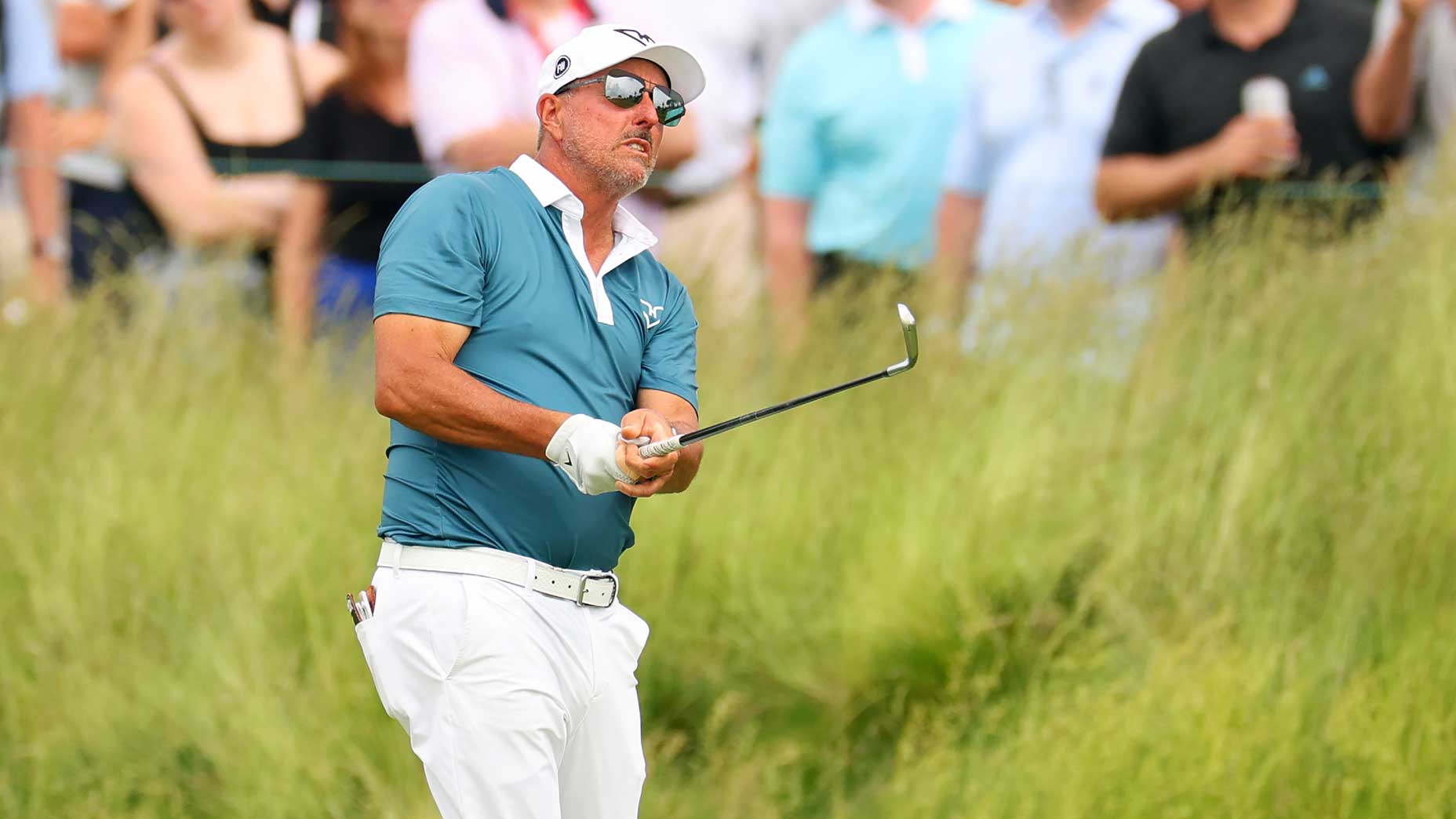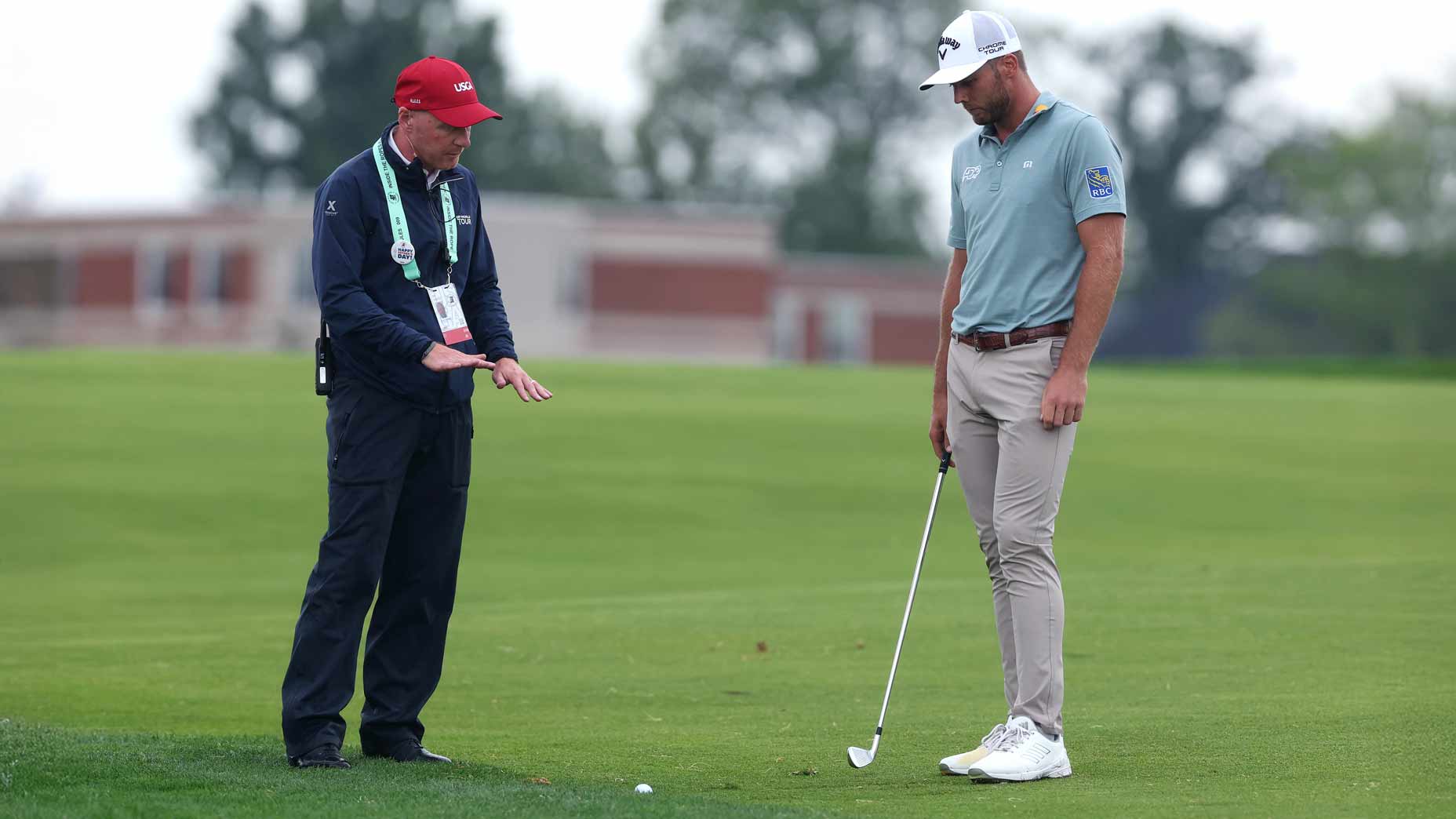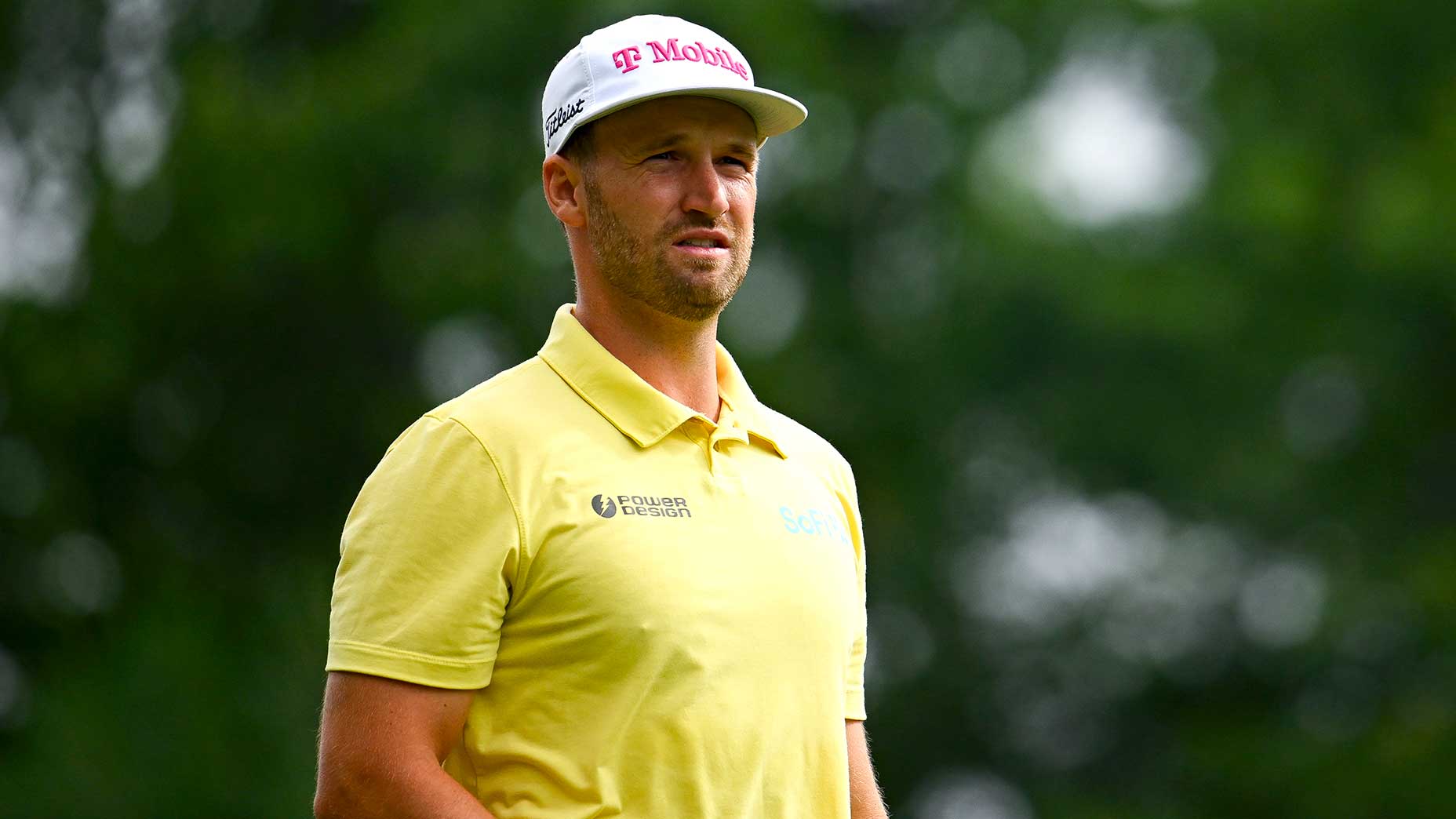Each and every one of Tiger Woods’ 15 major championships has had its own identity. The 1997 Masters? Historic. The 2000 U.S. Open? Dominant. The 2019 Masters? Iconic.
The 2008 U.S. Open? Excruciating.
Arguably one of Tiger’s greatest triumphs, that 2008 Open at Torrey Pines was also his most heroic. Just two months after undergoing his fourth knee surgery, Woods arrived in La Jolla, California, with the state of his game an enormous unknown. Would his knee hold up in grueling U.S. Open conditions? And where was he mentally? Legit questions, even for — at that time — the top-ranked player in the world.
Despite limping his way around what was then the longest course in U.S. Open history (7,643 yards), Woods found himself in the mix after the first two days of the tournament. Rounds of 72 and 68, including a second-nine 30 on Friday, put him one shot behind 36-hole leader Stuart Appleby.
Saturday brought more fireworks from Woods, as he continued to play through debilitating pain. Two eagles over his final six holes left Torrey on the verge of eruption — and Woods the 54-hole leader.
With 18 to play, the stage was set for one of the most unique and memorable Open finales of all time. Just ask those on the grounds that day. In the broadcast tower. And in the scoring room a mere lob wedge away from the 72nd green.
THE SCENE: After a back-nine 33 on Saturday, Woods entered Sunday with a one-stroke lead over Lee Westwood and two shots clear of lovable, 45-year-old journeyman Rocco Mediate. Tiger, 32, had never relinquished a 54-hole lead in a major championship, but his health led many to question whether his badly damaged left knee and leg would endure a fourth round.
Mark Rolfing, NBC Golf reporter: I was staying on the fifth floor of the Lodge at Torrey that week, which is the same floor where Tiger was staying, and I’d witnessed the parade of people coming in and out who were treating his leg. I knew what was going on with him.
Steve Williams, Woods’ caddie: Tiger was in such poor physical shape. He was getting so much treatment, just to enable him to compete. Most tournaments, we’d have dinner or do something each night, but that week he never left his hotel room.
Was his leg going to break down? Or was Tiger going to do something special?
Dan Hicks, NBC Golf’s play-by-play announcer: There was a tremendous amount of anticipation on Sunday, especially after what had transpired the day before. Tiger had made those two eagles on the back nine, and it propelled us into wondering if Sunday would be the final act. Was his leg going to break down? Or was Tiger going to do something special?
Williams: It was a tournament he had set his mind on from the moment the USGA announced, I think in 2004, that the 2008 Open would be held at Torrey Pines. He won four straight Buick Invitationals there, from 2005 to 2008. It was just incredible how a lightbulb seemingly went off in his mind. In the entire time I caddied for him, he was more intent on winning that U.S. Open than any other championship. His fascination bordered on obsession. But at the start of the second round I said to him, “Tiger, you are going to have a lot more U.S. Opens to play in. You’re probably damaging your leg even more here. We’re close to the clubhouse. Maybe it’s time to call it quits.” He told me in no uncertain terms he was going to win the tournament.
Mediate, in Sunday’s second-to-last group, was already on the course when Woods, paired with Westwood, stepped to the 1st tee. The anticipation was intense.
Rolfing: I remember there was this overriding buzz that you get only in a few places in golf. You don’t get it at the Masters, because the patrons are quiet. This was like 20,000 people all talking at the same time about what was going to happen. I was surprised at how evenly split the crowd was. There were a lot of people rooting for Rocco.
Donn Van Winkle, a spectator in the gallery: I’d been to a lot of tournaments at Torrey and Riviera, but this was my first major. Plus, Sunday at the U.S. Open is always Father’s Day, so it was teeming with dads and their kids. Let’s just say it was not anything like the old Andy Williams Open. It was electric.
Hicks: Tiger got off to a crazy start, double-bogeying his first hole for the third time in four days. It was nuts, but it didn’t faze us because we had seen it all week.
Van Winkle: My wife and I got a spot along the ropes of the No. 2 tee when Tiger arrived. He teed off with a 3-metal and winced a little after the shot. Walking off the tee box, he used his club as a cane, and after a few steps he bent over, in visible pain, his hands dropping to his knees. He stood there for a moment, gathered himself and set off down the fairway. We were shocked. There was a lot of chatter. How was he going to make it through four holes, let alone an entire round?
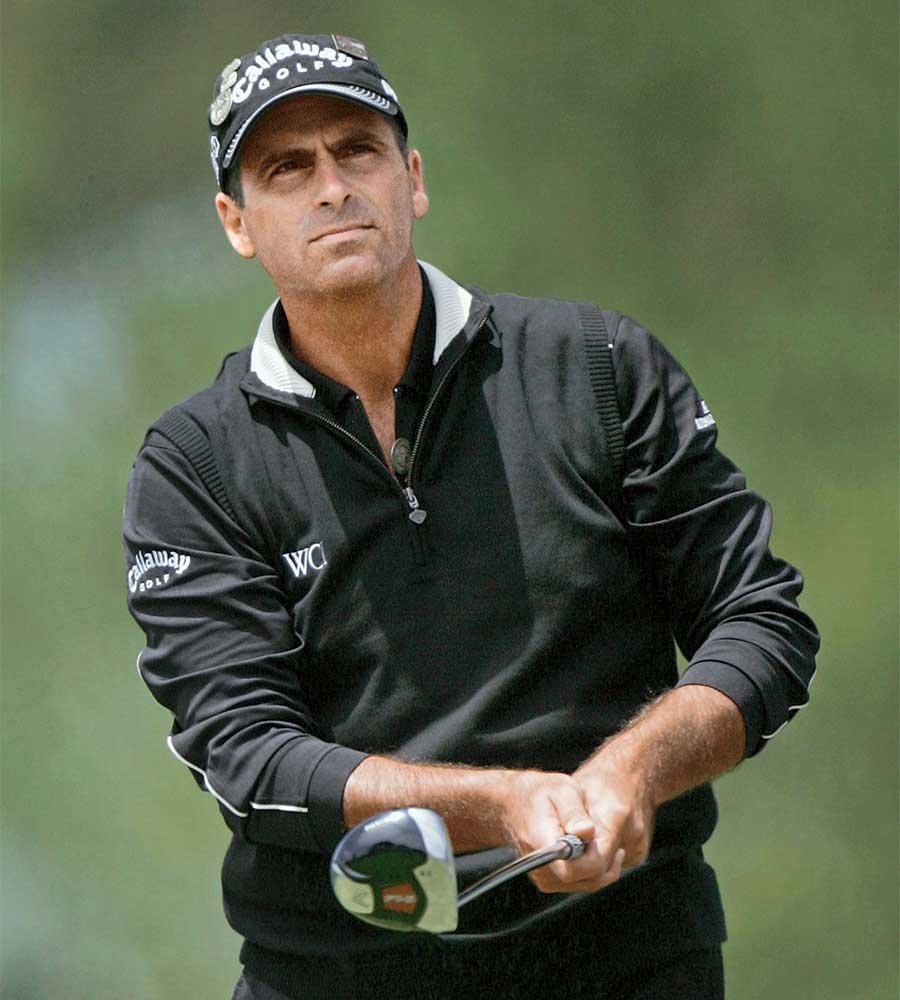
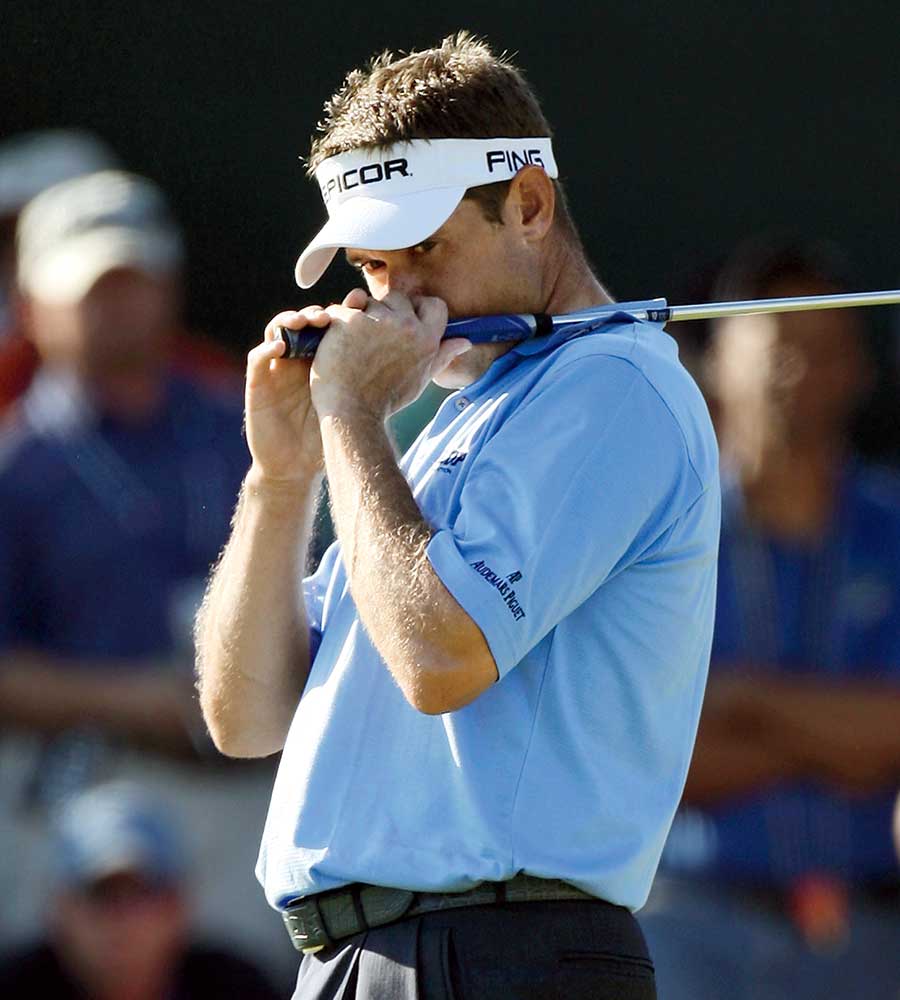
Hicks: The word that kept running throughout my brain was expecting. Despite his physical pain, we expect greatness from Tiger. I remember looking around Torrey Pines. I could see and sense the feeling of the moment. It was the same feeling everybody had during the Tiger Era. There was a level of expectancy, and that’s the sense I got from the crowd.
The lead seesawed throughout the day. After three holes, Mediate edged Woods by two. When Tiger finished the 4th, the lead was one. On the 5th and 7th tee shots, Woods’ pain was conspicuous again — but his game was steady.
Johnny Miller, from NBC’s live broadcast, surveying the shot: “He’s been hitting it nine miles with the bad knee, folks, just so you know. The second-longest hitter this week.”
Following a final-round 71, Mediate walked off the 18th green leading the U.S. Open at one under par.
Rocco Mediate: It had been really loud all day. Underdogs are popular, and when the underdog is competing like I did, they become real popular. When I tapped in, I looked at my caddie Matthew and said, “I don’t know. I don’t know.” I just didn’t think it was over with Tiger and Lee Westwood coming in behind me.
Woods and Westwood arrived at the 575-yard, par-5 72nd hole one stroke behind Rocco and needing birdies to enter a playoff. Both of them missed the fairway off the tee and were forced to lay up. Westwood reached the green in three. For his third, Woods had a 105-yard approach out of thick rough.
Miller: “It will kick left and spin left, so he’s gotta keep it about 10 feet right of the hole if he wants to get it close.”
Hicks: Johnny Miller and Roger Maltbie did such a great job setting up just how tricky that shot was, especially when you don’t have control of it from the rough. Roger described it as a nasty lie that can take you out of your comfort zone when you’re trying to win. That shot could have left Tiger with 30 or 40 feet to tie. Instead, he stuck it inside 15 feet. The shot has probably never been given its due because of what he did next.
[Rocco] said, ‘If you end up covering a playoff tomorrow, don’t leave me. I’m going to need somebody to talk to.’
Mediate was, at this point, watching from the scoring area, and Johnny Miller had a message for him.
Miller: “Don’t check out of your hotel, Rocco.”
Mediate: Once Lee and Tiger were both on the green, I was ready for Monday already. There was no way they’re both missing. Everybody was saying that the greens were bouncing, but we’d played them all day and made putts. I figured it was going to happen.
Rolfing: I was in the scoring area with Rocco, watching on a monitor as Tiger played the 72nd hole. Rocco was his typical nervous self, pacing around. But he kept saying to me, “I want him tomorrow. I want Tiger for 18 holes.” I remember saying to him, “Wouldn’t you rather just win the thing?” And his answer was unequivocally no. He wanted a playoff against Tiger Woods.
Mediate: Of course I would love to have won it right there, but it wasn’t going to happen. I wanted to have Tiger one more time, to try to beat him when it mattered.
Van Winkle: We tried to get close to the 18th green, but there were so many people we got stuck between the green and the Lodge. We were only about 30 yards away, but we were sardined in and couldn’t see a thing.
Lee Westwood: The crowd around the green was 10 rows deep, plus people leaning out of their hotel rooms and standing on tree limbs. It was intense.
Xander Schauffele, a 14-year-old golf fan at the time: I was at the 18th, hanging by a tree that had recently fallen due to storms. I was up on the tree stump to try and get above the crowd.
Westwood had a 15-footer and would putt first, attempting to tie Mediate.
Hicks: There was tenseness to the whole situation. I don’t know that it’s ever been duplicated in any kind of golf event that I’ve been a part of. It was all because of Tiger. We knew Tiger was gonna go last. This is no slight at Lee Westwood, but there wasn’t the expectancy of him making that putt. It was almost like he cleared the stage. Had Lee made it, it would have been unbelievable, forcing Tiger to make his to get into a three-man playoff. But it wasn’t meant to be.
Westwood: I hit a good putt that didn’t drop.
The Englishman tapped in for par, finishing one stroke out of the playoff.
Rolfing: At this point, Rocco had kind of latched on to me, and he was so nervous. He wanted somebody to talk to, and it turned out to be me. In fact, he said, “If you end up covering a playoff tomorrow, don’t leave me. I’m going to need somebody to talk to.”

Williams: When you’re on the 72nd hole and you’re caddying for Tiger Woods, the upcoming putt is a foregone conclusion. I was already focusing on the playoff, thinking about where the pins would be for the next day. I had no doubt he was going to hole it.
As Woods scrutinized every angle of his birdie putt, a full 60 seconds of silence elapsed on the NBC broadcast.
Hicks: Tiger was going to own the stage by himself. There was no one he was going to share it with in that moment. We had spent the week talking incessantly about Tiger’s injury, and the pictures basically told the story of how much pain he was in. As Tiger stalked his putt, there was nothing more for us to say. It was almost like he was in some sort of trance, hypnotizing himself to say, “Alright, we’ve done this before.” The whole thing was coming to a crescendo in Tiger’s head as well.
Williams: I didn’t actually have anything to do with the read. He just said it looked pretty bumpy, which it was. But I’d been caddying for him since 1999. You think about the amount of times on a 72nd hole that he had to hole a putt to win or force a playoff. He never missed. He had trained me to believe he’d make it.
Rolfing: While we were watching Tiger read his putt, Rocco turns to me and says, “You know how to tell whether I’m nervous or not? If you see me pacing back and forth, I’m fine. But if you see me walking in a circle, that means I’m really nervous.”
Van Winkle: As Tiger got over his putt, everyone stopped jostling for a spot. It got eerily quiet.
Hicks: I don’t like to think about anything before it happens, but the expectancy of the moment kept coming back to me. I kind of envisioned the people at home watching around the country and around the world, and in my mind everybody expects him to make this putt.
Twelve feet remained for Woods, a putt that Miller and Maltbie described as breaking an inch or two to the left and fast. Tiger jars it and crouches into a double fist pump that is, now, among the most unforgettable images in golf history.
Hicks, from NBC’s live broadcast: “Expect anything different?!”
Hicks: I took a moment to let the crowd noise swell, because they were like a volcano ready to erupt. Once they hit their crescendo, the words just came out.
Mediate: It was so loud that the scorer’s room shook.
Van Winkle: We were near the grandstands, and they were shaking! We knew we were witnessing greatness.
Miller: “That ball went in by a hundredth of an inch. That ball could have easily lipped out just as easy as it went in.”
Mediate: I expected it to happen. If I had been in shock, Monday was going to be a nightmare for me.
Williams: For two reasons, I’d say it could be Tiger’s finest moment. The first being the physical condition he was in; second, because it was a tournament he’d so obsessively set his mind on.
Mediate: It will go down as one of the greatest putts in the history of our sport.
Van Winkle: After jumping up and down and high-fiving every stranger around us, I hugged my wife and explained to her that a U.S. Open playoff is 18 holes the next day. I told her, “I need to call in sick to work tomorrow!”
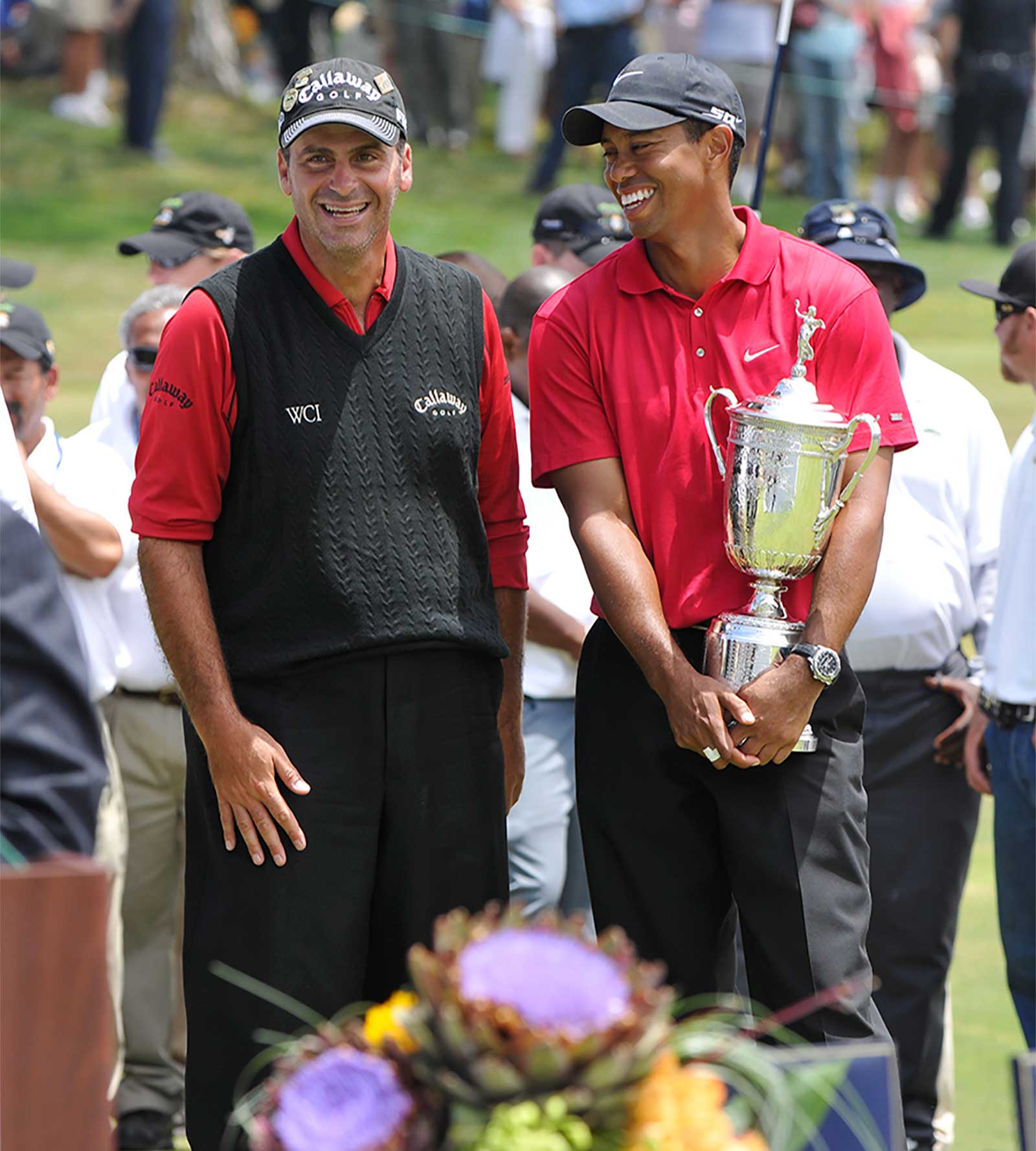
The following day, Woods and Mediate traded punches in a playoff that would require an extra hole — 19 in all — for Tiger to win his 14th major. Woods, naturally, showed up in red and black. And Mediate did too.
Williams: That certainly got Tiger’s attention.
Mediate: I had no intention of getting Tiger’s attention. It was my last clean shirt. And, besides, he wears red on Sundays. This was Monday! Truthfully, it never crossed my mind.
Williams: Rocco was a knockabout bloke and a fantastic personality. Tiger had to dig incredibly deep to win, and Rocco did not back down. I take my hat off to him. It was absolutely an astounding performance.
The same, of course, could be said of Woods, who, two days later, announced that he’d miss the rest of the season. What he knew and most of the golf world didn’t was that he’d entered the event with a torn ACL and a double stress-fractured tibia. He played the tournament on a broken leg. But that takes nothing away from Mediate’s bittersweet career moment.
Mediate: Everybody and their mother thought that I was going to get killed that day, except for me. I remember saying in the pressroom the night before the playoff, “Look, you guys think I’m going to get my butt handed to me, and I totally understand that. But we’re going to give you a show tomorrow.”
Hicks: Rocco played his own supporting role in the whole thing. I don’t think it is as good unless it’s Rocco as the other guy, because people absolutely fell in love with him. He’s just this bohemian kind of golfer who was the opposite of the thoroughbred killer that Tiger was.
Mediate: To Tiger, that tournament was just another notch in the belt, but for me it was the most fun day I’ve ever had playing golf against anybody. Against the best player who has ever lived, in our national open — I mean, how do you draw that up? You can’t. And the way I lost? It’s okay with me.
Additional reporting by Evin Priest and Sean Zak.
